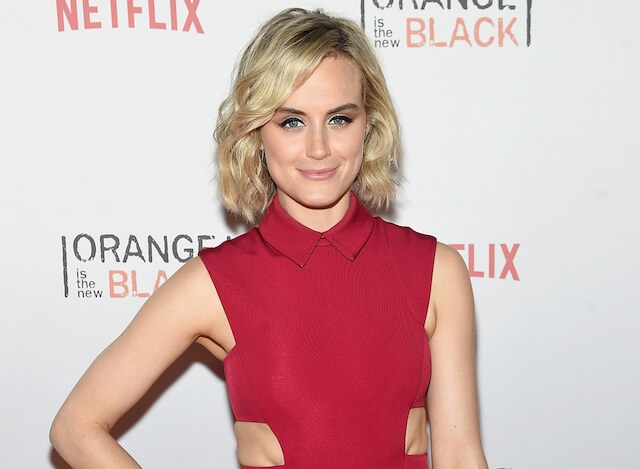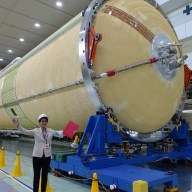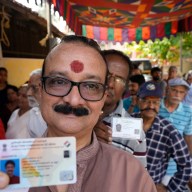Taylor Schilling can spend years on a TV show like “Orange is the New Black,” but she only had 11 days for the indie comedy film “The Overnight.” Still, in some ways the two are similar. They both sincerely explore lifestyles that go beyond the heteronormative. In “The Overnight,” Schilling and Adam Scott play a square-ish Los Angeles couple who spend a long night with a more free-spirited pair, played by Jason Schwartzman and Judith Godreche. But things don’t go as you may expect. Our conversation begins after her going through a fairly epic photoshoot, which prompts us to talk about our mutual dislike of selfies. I spoke to the German filmmaker Wim Wenders not long ago, and he called selfies a “perversion of photography.” His argument was that historically photography would aim outwards, and now it’s aiming inwards. It’s this idea — I’m sure people who are far smarter than I am have written about this — but this idea that you want to share yourself as a means of connection, but you’re curating what people see. You’re isolating yourself more from people. You’re sharing a mask. You’re sharpening the lie. We’re actually becoming less vulnerable and connected. And then there’s the way nice people can unleash their inner jerks on the Internet.
I have to stay away from the Internet now because it’s too intense. People are too cuckoo. On the other hand, you can choose not to engage with it but then you’re not being part of the modern world. RELATED: Our review of “The Overnight,” starring Taylor Schilling and Adam Scott Over to “The Overnight.” I have to admit I thought this was going to be a film where a normal couple get creeped out by a weird couple, but the film winds up not only embracing alternative living but exploring the anxieties that come with it. I think there’s a real sweetness to it, and a real kindness — a kindness in how it treats these people’s idiosyncrasies. No one’s making fun of them or judging them, as though they were evil swingers and great square people. There’s none of that. And there’s no judging their sexuality. There’s a kind, accepting lens through which this story is told. That’s what makes it fresh and interesting, and funny. It’s OK to laugh because no one is being judged. Even Scott’s monologue about his atypically tiny penis is both funny and touchingly earnest.
It’s genuinely about somebody accepting something about themselves that isn’t socially acceptable. They come to think “I am enough, regardless of the outcome or what outside norms may be telling me.” It’s a ferociously self-accepting stance. It’s cool. It’s in the context of a small penis, but you can relate it to anything. Your character is the closest thing to a straight man, so to speak, but even she goes along with what happens.
There’s nothing judgmental about her. She’s not the whiny or nagging wife, the ball and chain. There’s something about her that is really open to everything, and earnestly trying to understand or reconcile her own feelings of hesitancy. She doesn’t want to take things at face value. She really is trying to engage and it not judge people, including her husband. It makes her fun. She’s playful. She really wants to be a part of the party. She’s also acknowledging that there are parts of this she can’t wrap her head around. She thinks, “I’m trying to understand it and it’s not making sense. But I am enough of a thinking person to eventually act upon what I’m seeing.” In doing that she comes to understand herself better and their relationship gets better. Even for an indie, this looks tiny. It’s almost like a play, at times.
Everything was really conducive to making it, because it is a really intimate film about really intimate moments and the depth behind tiny interactions. There was four of us and a skeleton crew; we were all so intimate with each other. We shot it all at night. I’d never done anything like this. We shot the movie in 11 days and our calls were 6 p.m. and we wrapped around 6 a.m. Other films might have the budget to shoot during the days and black out the curtains. We didn’t have the lighting budget for that. But it was incredible, because you hit that ecstatic, weird, goofy, totally nutty moment that happens when you’re up until four in the morning — that weird feeling of “What time is it? Holy s—, the sun’s coming up, what have I done all night?” That lent itself to the movie. Did you adjust well to that?
It was terrible. I didn’t adjust to it. I was a mess. It was hard. [Laughs] I was a basket case. I wasn’t sleeping. I was eating huge meals at midnight. It was just really hard.
Film seems like such a gear-shift for actors who also do television.
There’s a comraderie that develops knowing we’re setting up camp [for a film] and it’s going to have to end. There’s a real depth that can happen in filmmaking that is not exclusive to film but is harder to create in television. Different relationships develop in television. It can really feel like family after being together for so long. That’s invaluable. My family on “Orange is the New Black” is so incredibly important to my life. You’re like a troupe. You know each other’s rhythms. With writers it’s the same thing. In TV you depend on the writers. But the directors are much more transient. I really rely on a director a lot, so that relationship is really important to me. There’s something really settling about being able to put your faith in one director.
Taylor Schilling on the kindness of ‘The Overnight’

Getty Images
Follow Matt Prigge on Twitter @mattprigge


















